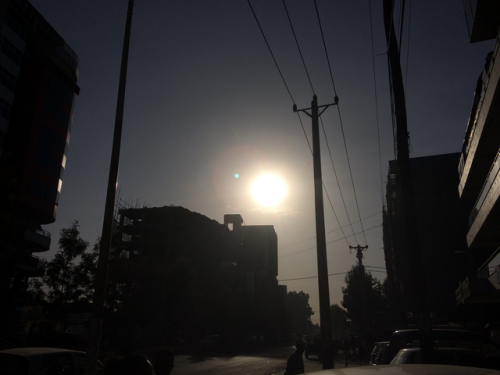Carpool
The streets were eternal back thenback when back seat was a canopy of armsstretched out like the solsticethe thump of tire on chewed cementjolting the deviance from feeble bodiesMomma was no pilot, bu... Read more
Time Machine
A time travel machine. It might sound futuristic, something science fiction writers spend pages and pages imagining. In fact, I have seen one. I will try to describe it for you, in case you have seen ... Read more
Grieving a Stranger
My parents came to Canada as refugees in the late ’80s for better opportunities and to escape Ethiopia’s hellish dictatorship. Though I cannot know the extent of their struggles, I can speak of th... Read more
True Blue
Elvis isn’t dead. He lives in Kitchener, Ontario, on a bench outside the grocery store. “One for the money!” I’m always tempted to say, as I dump a pathetic amount of change into his blistery ... Read more
Cerasee
“Dawn! Come put on yuh shoes!” Dawn’s mother exclaimed from the kitchen, a small room at the back of the house where a portable kerosene stove and a tall eggshell white fridge fed the family of ... Read more
Three Poems
Untitledmy mother is a pile of dust between two bricks unable to be condensed to a finer powder she sleeps in her ashtray next to the cigarettes that numb her I walk through the door just make a good ... Read more
Skin
Textile · Yvonne Tagoe - SkinMy skin is a beautiful gift not a sin But in this foreign land They don’t understand that my skin is my pride and joy In this foreign land far from home my skin is a so... Read more
Tiles
For Indigenous peoples across Turtle Island, the pandemic deepened pre-existing inequities. The aid that settler-colonial systems offered did not account for (or value) the importance of physical and spiritual spaces for Indigenous communities. Locally, urban Indigenous youth who were just beginning to learn about their culture were suddenly denied access to spaces they needed in order to be in relationship with each other and with the land. Building relationships with the land and with each other in a face-to-face way is an important part of reconnection and healing; removing these connections deeply impacted Indigenous youth and made it necessary to adapt art projects accordingly. To navigate this, Textile supported Pins and Needles Fabric Company, an Indigenous inter-arts company in Waterloo Region, in co-designing an art program with Indigenous youth. Through online talking circles and in-person meetings with appropriate physical distancing, youth considered the following questions: How is Indigeneity (re)claimed or denied during this pandemic? How does physical distancing and self-quarantine impact relationships to the land and to the community? Based on conversations on how youth wanted to express themselves, participants were delivered art-kits containing supplies to make tile art on wood panels to respond to these questions. The following feature shares artwork from two of the seven youth who engaged in this program. Read more

Grieving a Stranger (Digital Storytelling Workshop)
My parents came to Canada as refugees in the late ’80s for better opportunities and to escape Ethiopia’s dictatorship. Though I cannot know the extent of their struggles, I can speak of their consequences... Read more

